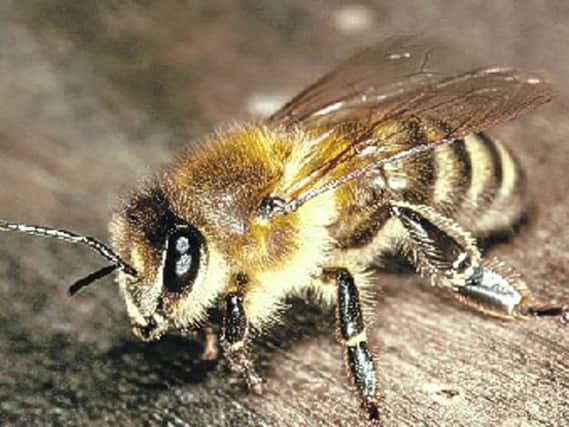Native black bee reserve to be created on Colonsay


The landmark reserve is to be established on the island of Colonsay for the native black bee (Apis mellifera mellifera) .
The honey bees currently kept on Colonsay are thought to be one of the few surviving populations of “Amm” bees - the only sub-species of honey bee native to northern Europe.
Advertisement
Hide AdAdvertisement
Hide AdA Scottish Government spokesman aid: “The black bee is thought to be the only native honey bee in Scotland and the new legislation, The Bee Keeping (Colonsay and Oronsay) Order 2013, comes into force today.
“It protects the species from cross-breeding and disease, and means it will be an offence to keep any honeybees that are not black bees on Colonsay and Oronsay.”
Paul Wheelhouse, the Scottish Environment and Climate Change Minister, said: “The black bee is an important genetic resource for all beekeepers – from a Scottish perspective and a considerable academic interest too. Our belief in this has led us to seek protection for the bee and thus help to protect its genetic integrity from long term dilution and loss of this important asset. The introduction of this strong, landmark legislation – overwhelmingly backed in our consultation last year - will go a long way to achieving our aim.
“The colonies being kept on the island are an increasingly rare source of black bees left in Europe, highlighting the importance of this reserve – the first of its kind in the UK.
“The Bee Keeping Order will ensure that the population of black bees on Colonsay are protected from hybridisation with non-native bees, ensure a bright future for black bees on the island and illustrates how our non-native species legislation can be used to protect our natural wildlife.”
Andrew Abrahams, currently the only beekeeper on Colonsay, said: “I am naturally delighted with the Scottish Government’s commitment to help conserve our native honey bee.
“Colonsay’s isolation and rich floral diversity make it an ideal location for a Reserve that can maintain genetic purity and a disease free population of black bees.
“The Scottish Government’s recognition of the Colonsay and Oronsay Reserve will also help and inspire other beekeepeers throughout Scotland to work with and conserve black bees.”
Advertisement
Hide AdAdvertisement
Hide AdA Government consultation document on the Colonsay protection plan states: “The honey bees currently kept on Colonsay are thought to be one of very few Amm populations in Europe, as such they are a valuable genetic resource.
”The honey bees found in Scotland today are a domesticated animal with some colonies living in the wild. All of the current Amm populations in Scotland are kept as livestock. Amm is the only sub-species of honey bee native to northern Europe. The Scottish Government considers that the keeping of any honey bee on Colonsay and Oronsay is likely to have a significant adverse impact by hybridising with the Amm population. Such an outcome, when the impact is in a rare population of pollinators, has an impact on both environmental and socio-economic interests. All honey bees other than Amm are therefore considered to be invasive on Colonsay and Oronsay.”